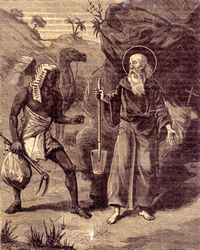Lives of the Saints
Our Models and Protectors
Spiritual Bouquet:
January 2

Saint Macarius
of Alexandria
Hermit
(† 394)
Saint Macarius when a youth left his fruit-stall at Alexandria to join the great Saint Anthony; that patriarch, advised by a miracle of his disciple's sanctity, named him the heir to his virtues. For a time he remained in the Thebaid with his fellow hermits, but later he went to the desert of Scete. He had a cell there and others in two distinct places, but his principal dwelling place was the desert of the Cells. All of these cells were for him a source of mortification, being without window, or too short for him to lie down.
The life of this solitary was one long conflict with himself and with the demons. I am tormenting my tormentor, he replied to a hermit who met him in the heat of the day, bent double with a basket of sand. Whenever I am slothful and idle, I am pestered by desires for distant travel. When he was quite worn out he returned to his cell. Since sleep at times overpowered him, he kept watch standing for twenty days and nights; then, being about to faint, he entered his cell and slept, but thereafter slept only at will.
When for six months the demons tormented him with temptations, he would go to a marsh and remain naked in the water until his body was covered with noxious insect bites and boils, and he was recognized only by his voice. Once, when being thirsty he received a present of grapes, he passed them untouched to a hermit who was toiling in the heat. This one gave them to a third, who handed them to a fourth; in this way the grapes went the round of the desert and finally returned to Macarius, who thanked God for his brethren's self-denial.
Macarius saw demons assailing the hermits at prayer. They put their fingers into the mouths of some and made them yawn. They closed the eyes of others, and walked upon them with contempt when they fell asleep. They placed vain and sensual images before many of the brethren, and then mocked those who were captivated by them. None vanquished the devils effectively save those who by constant vigilance repelled them at once. He called some of the solitaries to come to him and asked them if they had not thought about buildings, journeys or other such things. They acknowledged their fault, seeing he had perceived the vain thoughts which distract souls during prayer, caused by the illusion of the devils, and which the vigilant reject as foreign to their purpose.
After being many years Superior, Macarius, desiring humiliation and spiritual progress, fled in disguise to Saint Pachomius to begin religious life over again as his novice. Soon the brethren were going to their Superior to tell them of the extraordinary mortifications of the newcomer. Saint Pachomius prayed, and then, instructed by a vision, addressed Macarius by his name, saying he had long wanted to know him. And he thanked him for having given such excellent examples to his religious. Then he bade him return to his former brethren in religion, who loved him as their father, to pray for Pachomius' monks as well.
At the age of seventy-three, Saint Macarius was driven into exile and brutally outraged by Arian heretics. He died in the year 394.
Reflection. Prayer is the breath of the soul. But Saint Macarius teaches us that both mind and body must be brought to subjection before the soul is free to pray efficaciously.
Les Petits Bollandistes: Vies des Saints, by Msgr. Paul Guérin (Bloud et Barral: Paris, 1882), Vol. 1; Little Pictorial Lives of the Saints, a compilation based on Butler's Livesof the Saints and other sources by John Gilmary Shea (Benziger Brothers: New York, 1894)